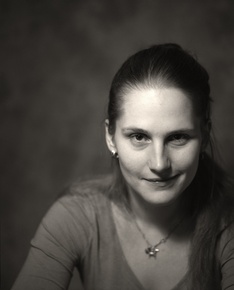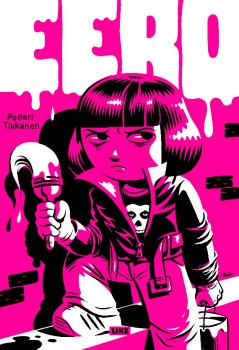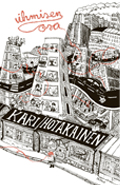Tag: literary prizes
Profession: author
10 December 2010 | In the news
Alexandra Salmela, 30, won the Helsinki newspaper Helsingin Sanomat Literature Prize 2010 for best first work, worth €15,000.
Her novel 27 eli kuolema tekee taiteilijan (’27 or death makes one an artist’, Teos) depicts a young woman’s search for her own place and calling in the world. Angie leaves her city of study, Prague, for a small Finnish village, wishing to become an author. Among the narrators are also a soft piggy toy, a cat and a car.
With degrees from both the Theatre Academy of Bratislava and Charles University of Prague, the Slovak-born Salmela majored in Finnish and Finnish literature. She has lived in Tampere, Finland for the past four years. In her opinion Finns should scrap the myth about their difficult language.
The jury chose the winner from 80 debut works, finding Salmela’s novel highly original in its imaginative narrative techniques and language.
Once more: Sofi Oksanen’s novel wins a prize
10 December 2010 | In the news
Sofi Oksanen (born 1977) has received the Europe Book Prize, worth €10,000, for her novel Puhdistus (Purge, 2008). Chosen from a shortlist of eight works, the prize was awarded by the ex-chairman of the European Union Commission, Jacques Delors, in Brussels on 9 December.
The European Book Prize jury is made up of European journalists and correspondents and was chaired by the German film director Volker Schlöndorff. According to the jury, Puhdistus is ‘a brave and painful exploration into the traumas of the Estonian history’.
The prize was awarded this year for the fourth time. The author expressed her appreciation of the prize by saying Europeanness for her signifies freedom of speech, respect for human rights and the will of sustaining these fragile and easily damaged values.
Finlandia Junior Prize 2010
26 November 2010 | In the news
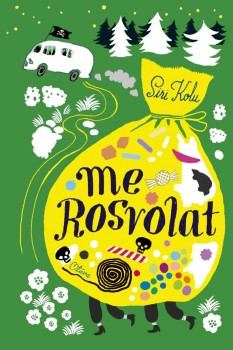 The Finlandia Junior Prize has gone to author Siri Kolu and illustrator Tuuli Juusela for the novel Me Rosvolat (‘Me and the Robbersons’, Otava); they will share the award of €30,000 (see the Prize jury assessments of the shortlist here). The winner was chosen by actor and writer Hannu-Pekka Björkman.
The Finlandia Junior Prize has gone to author Siri Kolu and illustrator Tuuli Juusela for the novel Me Rosvolat (‘Me and the Robbersons’, Otava); they will share the award of €30,000 (see the Prize jury assessments of the shortlist here). The winner was chosen by actor and writer Hannu-Pekka Björkman.
Awarding the prize on 25 November he said: ‘It caught my attention that in none of the six shortlisted children’s books are there any so-called nuclear families, at least not for long. The main characters constantly live and grow without something – the lack of parents or the attention of an adult is a serious matter to a child. However, in these books there is always someone who cares, not perhaps a stereotypical mom or dad, but an adult nevertheless.’ In Björkman’s opinion Me Rosvolat, with its rich language and a whiff of anarchy, presents the reader with moments of realisation and wonderment.
Finlandia Prize for Non-Fiction 2010
19 November 2010 | In the news
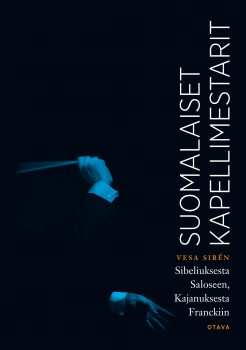 A massive tome running to 1,000 pages by Vesa Sirén, journalist and music critic of the Helsingin Sanomat newspaper, features Finnish conductors from the 1880s to the present day. On 18 November it became the recipient of the 2010 Finlandia Prize for Non-Fiction by the Finnish Book Foundation, worth €30,000.
A massive tome running to 1,000 pages by Vesa Sirén, journalist and music critic of the Helsingin Sanomat newspaper, features Finnish conductors from the 1880s to the present day. On 18 November it became the recipient of the 2010 Finlandia Prize for Non-Fiction by the Finnish Book Foundation, worth €30,000.
The choice, from six shortlisted works, was made by economist Sinikka Salo. Suomalaiset kapellimestarit: Sibeliuksesta Saloseen, Kajanuksesta Franckiin (‘Finnish conductors: from Sibelius to Salonen, from Kajanus to Franck’) is published by Otava.
The other five works on the shortlist were Itämeren tulevaisuus (‘The future of the Baltic Sea’, Gaudeamus) by Saara Bäck, Markku Ollikainen, Erik Bonsdorff, Annukka Eriksson, Eeva-Liisa Hallanaro, Sakari Kuikka, Markku Viitasalo and Mari Walls; the Finnish Marshal C.G. Mannerheim’s early 20th-century travel diaries, Dagbok förd under min resa i Centralasien och Kina 1906–07–08 (‘Diary from my journey to Central Asia and China 1906–07–08’, Svenska litteratursällskapet i Finland & Atlantis), edited by Harry Halén; Vihan ja rakkauden liekit. Kohtalona 1930-luvun Suomi (‘Flames of hatred and love. 1930s Finland as a destiny’, Otava) by Sirpa Kähkönen; Suomalaiset kalaherkut (‘Finnish fish delicacies’, Otava) by Tatu Lehtovaara (photographs by Jukka Heiskanen) and Puukon historia (‘A history of the Finnish puukko knife’, Apali) by Anssi Ruusuvuori.
Book-giving time!
12 November 2010 | In the news
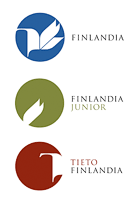 The few weeks before Christmas are when most books are bought in Finland, so shortlists of literary prizes start popping up in November.
The few weeks before Christmas are when most books are bought in Finland, so shortlists of literary prizes start popping up in November.
All the juries of the three biggest prizes – worth €30,000 each, awarded by the Finnish Book Foundation – have now published their shortlists: the Finlandia Prize for Non-Fiction, the Finlandia Junior Prize and the Finlandia Prize for Fiction.
The winners, each chosen by one person, will be announced in December. This FILI – Finnish Literature Exchange newsletter link will take you to the jury members’ assessments of the shortlisted non-fiction and Junior Prize works.
The following six novels ended up on the Finlandia Prize for Fiction list:
Joel Haahtela: Katoamispiste (‘Vanishing point’, Otava), Markus Nummi: Karkkipäivä (‘Candy day’, Otava), Riikka Pulkkinen: Totta (‘True’, Teos), Mikko Rimminen: Nenäpäivä (‘Nose day’, Teos), Alexandra Salmela: 27 eli kuolema tekee taiteilijan (’27 or death makes an artist’, Teos) and Erik Wahlström: Flugtämjaren (in Finnish translation, Kärpäsenkesyttäjä, ‘The fly tamer’, Schildts). Here’s the FILI link to the jury’s comments.
Prix Femina for Sofi Oksanen
5 November 2010 | In the news
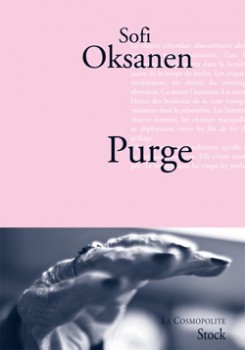 Sofi Oksanen’s novel Puhdistus (English translation, Purge, by Lola Rogers; French translation, also entitled Purge, by Sébastien Cagnoli), was awarded the French literature prize Prix Femina Étranger in early November.
Sofi Oksanen’s novel Puhdistus (English translation, Purge, by Lola Rogers; French translation, also entitled Purge, by Sébastien Cagnoli), was awarded the French literature prize Prix Femina Étranger in early November.
The Prix Femina was founded by the editors of the magazine La Vie heureuse (nowadays Femina) in 1904 as a counterbalance to the Prix Goncourt and the male-dominated award system. The jury members of Prix Femina are women only – whereas the prize can be awarded to either gender.
Among earlier winners of the Prix Femina Étranger – awarded since 1985 for the best foreign novel – are Amos Oz, Joyce Carol Oates and Ian McEwan.
The rights of Oksanen’s novel have so far been sold to 36 countries; Purge has sold approximately half a million copies the world over. In France – where the book also won the Le Prix du Roman Fnac in June – four print runs have sold more than 70,000 copies.
European Union literature prizes 2010
8 October 2010 | In the news
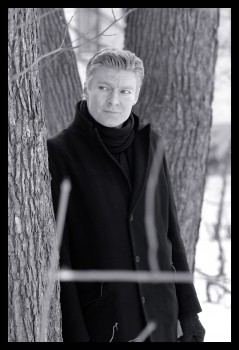
Riku Korhonen. Photo: Harri Pälviranta
With his novel Lääkäriromaani (‘Doctor novel’, Sammakko, 2009), Riku Korhonen (born 1972) is one of the 11 winners of the 2010 European Union Prize for Literature, worth €5,000 each. The winners were announced at Frankfurt Book Fair on 6 October.
The European Commission, the European Booksellers’ Federation (EBF), the European Writers’ Council (EWC) and the Federation of European Publishers (FEP) award the annual prize, which is supported through the European Union’s culture programme. It aims to draw attention to new talents and to promote the publication of their books in different countries, as well as celebrating European cultural diversity. Authors who have published two to four prose works during the last five years and whose work has been translated into two foreign languages at the most are eligible for the prize.
Korhonen has published two novels, a collection of short prose and a collection of poetry. Read translated extracts, published in Books from Finland in 2003, from his first novel, Kahden ja yhden yön tarinoita (‘Tales from two and one nights’, 2003) here. More…
French prize for Sofi Oksanen
26 August 2010 | In the news
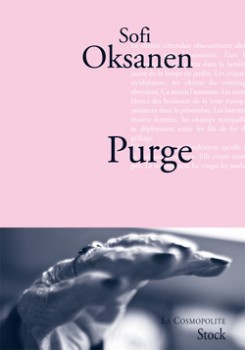 In August the ninth Prix du Roman FNAC was awarded to Sofi Oksanen (born 1977) for her novel Puhdistus (English translation, by Lola Rogers: Purge; see a recent British review [Guardian, August 21] here), to be published in French (by Editions Stock) on August 25 under the title Purge. This is the first time FNAC – the largest bookshop chain in France – has awarded the prize to an author who doesn’t write in French.
In August the ninth Prix du Roman FNAC was awarded to Sofi Oksanen (born 1977) for her novel Puhdistus (English translation, by Lola Rogers: Purge; see a recent British review [Guardian, August 21] here), to be published in French (by Editions Stock) on August 25 under the title Purge. This is the first time FNAC – the largest bookshop chain in France – has awarded the prize to an author who doesn’t write in French.
The jury consists of 900 booksellers and representatives from the general public. They read 300 novels published in France this year, and the winner was chosen out of 30 finalists.
The Finnish production company Solar Films Inc. will transform Puhdistus into a film in 2012: the screenwriter is Marko Leino.
Prose prizes
7 May 2010 | In the news
This year’s Finnish Government Prizes for Literature and Translation have been awarded to, respectively, the writer and journalist (and former Editor-in-Chief of Books from Finland) Kristina Carlson (born 1949) and the translator Tarja Roinila (born 1964). The prizes, which are given on the recommendation of the Finnish National Council for Literature and are worth €15,000 each, were awarded at a ceremony in Helsinki on 4 May by the Minister of Culture and Sports, Stefan Wallin.
Carlson’s second novel, Herra Darwinin puutarhuri (‘Mr Darwin’s gardener’, Otava), published last autumn, is a taut, deep and rich story narrated by many voices, contrasting science and faith, solitude and community. ‘It is not often that a single work renews the novel form,’ remarked the jury. (We featured an interview with Carlson, as well as an extract from the novel here on the Books from Finland website last September.)
The translator Tarja Roinila has specialised in prose and poetry written in Spanish, French and German; her latest translations, of the linguistically complex novels of the Austrian author Thomas Bernhard, are extremely musical, the jury remarked.
On 4 May, which was celebrated in Finland as the Day of the Book and the Rose (this custom, which originally took place on St George’s Day, April 23, was born in Barcelona: originally men gave women roses, and received books in return), Kristina Carlson received the Kiitos kirjasta (‘Thanks for the book’) medal, awarded jointly by the Booksellers’ Association, the bookshop sales asistants’ association Libro and the Finnish Library Association.
Nordic prize to Sofi Oksanen
31 March 2010 | In the news
The Nordic Council’s Literary Prize 2010 has been awarded to Sofi Oksanen for her novel Puhdistus (‘Purge’, WSOY, 2008).
The winning novel was selected by a jury from a shortlist of 11 works from the Nordic countries. The prize, worth approximately 47,000 euros, will be awarded in Reykjavik in November.
The novel, about women’s fates in the violent history of 20th-century Estonia, was awarded both the Finlandia Prize for Fiction and the Runeberg Prize in Finland, where it has sold more than 142,000 copies.
So far publication rights have been sold to 27 countries; the English translation, by Lola Rogers, will appear next month in the US, published by Grove Press.
Comic prize
26 March 2010 | In the news
Sarjakuva-Finlandia, worth €5,000, is the name of a prize created in 2007 for Finnish graphic novels or comic books. (Sarjakuva, literally ‘serial picture’, refers to both comic strips and books as well as graphic novels.)
It is awarded annually at the Tampere comics festival (and has nothing to do with the Finlandia prizes for literature, awarded by the Finnish Book Foundation).
Out of 56 contestants, ten made it into the final run, and the winner, Eero, by Petteri Tikkanen, was chosen by the thriller writer Matti Rönkä.
Petteri Tikkanen (born 1975) is a graphic artist who has published several books. In his previous graphic novels about a girl named Kanerva, Eero has appeared as her friend. Now Eero is the central character, and it seems childhood is over. Kanerva likes to chill out with her girlfriends only – what is a boy to do?
And the winner is…
9 February 2010 | In the news
The Runeberg Prize for fiction, given this year for the twenty-fourth time, went to Kari Hotakainen (born 1957) for his novel Ihmisen osa (‘The human lot’, Siltala, 2009). The prize, worth €10,000, was awarded on 5 February – on the birthday of the poet J.L. Runeberg (1804–1877) – in the city of Porvoo.
The jury – representing the prize-founders, the Uusimaa newspaper, the city of Porvoo, both the Finnish and Finland-Swedish writers’ associations and as the Finnish Critics’ Association – chose the winner from a shortlist of seven books. ‘The picture of a fast-changing society that Hotakainen paints in his novel is not a comforting one, but neither is it hopeless…. chilling and perceptive, but not without sharp comedy’, the jury concluded.
Our favourite things
29 January 2010 | Letter from the Editors
Every reader has his or her favourite book. It is possible to define, with acceptable criteria, when a work of fiction is ‘a good novel’: do the plot, characterisation and language work, does it have anything to say? But when is a ‘good’ novel better than another ‘good’ novel? More…
Awards for young fiction
29 January 2010 | In the news
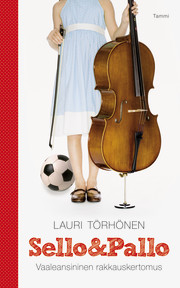 This year’s Topelius Prize has gone to Sello & Pallo. Vaaleansininen rakkauskertomus (‘Cello & Ball: a pale blue love story’, Tammi), a first novel for young people by the scriptwriter and film director Lauri Törhönen. More…
This year’s Topelius Prize has gone to Sello & Pallo. Vaaleansininen rakkauskertomus (‘Cello & Ball: a pale blue love story’, Tammi), a first novel for young people by the scriptwriter and film director Lauri Törhönen. More…
Antti Hyry: Uuni [The stove]
22 January 2010 | Mini reviews, Reviews
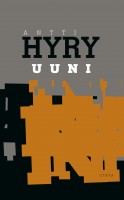 Uuni
Uuni
[The stove]
Helsinki: Otava, 2009. 400 p.
ISBN 978-951-1-23845-4
28 €, hardback
Many authors have inspired imitators, at least for a brief period, but few prove to be so original that they lend their name to an entire stylistic movement. Antti Hyry (born 1931), whose debut work was published in 1958, is a member of this most influential class of writers. His pared-down ‘Hyryesque’ sentences, which convey in a stark, crystal-clear manner only that which his characters think or observe, have been at the core of Finnish modernism for over half a century now. His latest novel, a tranquil, even meditative work, describes in minute detail – virtually brick by brick – how a man constructs a great wood-burning hearth in his house. Alongside the building work, Hyry provides minutely observed details of the natural surroundings and nearby people. Rich in content and brilliant in its simplicity, this novel was awarded the 2009 Finlandia Prize for fiction.

